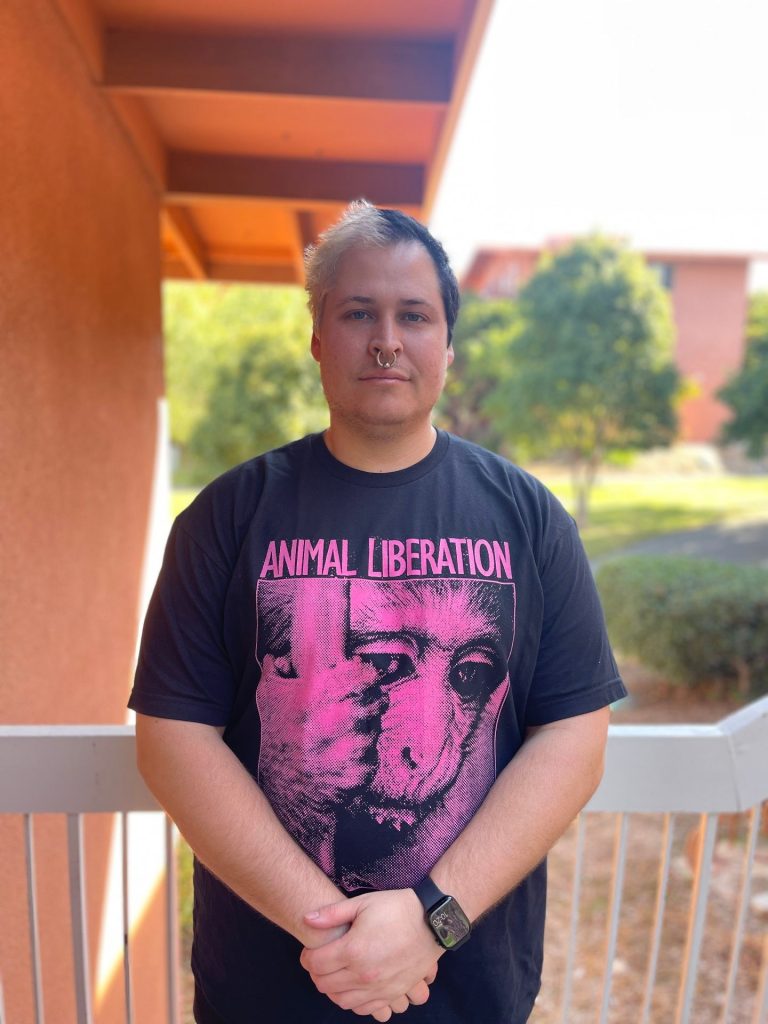Tyler Smith is a 4th year Ph.D. student in astro-particle physics who also serves as a leader in the Physics Grad Caucus (PGC) and Physics and Astronomy Community Excellence (PACE). His contributions have greatly improved both programs, and thus the graduate experience at UCI. He says he loves interacting with fellow colleagues through mentoring and teaching in both PACE and PGC.
Alongside Tyler’s service to graduate programs at UCI, he is heavily involved in research in both astronomy and particle theory. His research interests include the nature of dark matter and dark energy, the origin of baryon asymmetry, and one unified theory using gravity and Quantum Field Theory. His main research focuses on the significance of anomalies in physics beyond the Standard Model. On the particle side, he works to show that new vector boson models corresponding to conserved gauge symmetries have leading constraints from anomalous triangle amplitudes, something the theory was previously thought to be safe from. On the astronomy side, he focuses on modeling binary black hole formation and merger rates starting from first principles and galaxy relations and using gravitational wave observations.
When Tyler first got to UCI, he was put into contact with the last PGC administrator, Manuel Paul. PGC acts as a liaison between the graduate students and the department and organizes some department events. In his second year working in PGC, he started training to become the new program administrator. He has been the administrator for PGC for two years now, and has helped organize community building events. Many events are aimed at getting graduate students out of their shells and to help build community in the department. This includes prospective visit days, where Tyler typically gives a small presentation to the prospective grads, organizes a mini-symposium for the prospective students, takes them on a tour of University Town Center, and hosts an after party for them to feel a sense of the community at UCI. Through PGC, he has also facilitated collaboration between other grads organizations such as UNITY and DECADE. Recently, he implemented a yearly Town Hall where fellow graduate students met to assess the current state of the program and department. Tyler says he loves the sense of community PGC brings to the department. It is at PGC events that he gets to mingle with students he doesn’t typically see on a weekly basis, regardless of sub-field and year. PGC is a team effort, and Tyler mentions he couldn’t do all of this without the help of the other cabinet members, which has now doubled from 9 to 18 members since he started. In the next year he plans to take a step down from PGC and let our new leader Pranav Premnath take over.
Tyler joined PACE because he states he was a product of PACE: he went to Fire-Up Fridays in his first year, interacting with people outside of his sub-field and learning from them. He also had a great Exceleration mentor Jason Baretz. Tyler recalls his first year being a difficult time trying to juggle being a full time father since the kiddos couldn’t go to school during the pandemic and being a first year physics Ph.D. student. His mentor, Jason, was always there to listen and help guide him through problems. Because of this experience he wants to give back to other students. He first joined as an Exceleration mentor and fire-up Friday mentor and is currently in his second year on the leadership team for PACE. During his time in PACE, he has mentored 5 first year graduate students and hosted several attitude thrusters (workshops focused on topics such as advancement to candidacy and mental well-being). He has also worked on the curriculum for some Fire-Up Fridays and helped run them over the past year. Currently, he is in the process of starting a new PACE initiative called NOVA (Nurturing Opportunities to eleVate undergrAduates). NOVA is meant to create a connection between the graduate and undergraduate students with the goal of increasing the number of undergraduates who feel comfortable in the department, are involved in research, and eventually go off to attend graduate school themselves. In particular, he says that the transfer population holds a special place in his heart, being a first generation transfer student himself. The program will include a graduate to undergraduate mentoring program, a series of workshops for transfers and 1st/2nd year traditional students, and workshops focused on preparing undergraduates going into their last year.
In the future, Tyler would like to stay in academia and get a postdoctoral position. In his spare time, he loves being a father to his two daughters. He also loves to weightlift, as it helps him relieve stress and keeps him energized. For work-life-balance, he has a set schedule: gym, take girls to school, work from 9am-5pm, and then go home and spend time with his girls. Unless he has a looming deadline, he won’t work past 5pm on work days or much on the weekends to ensure he spends time with his kids.
For anyone interested in getting involved in department programs, Tyler encourages them to just start! He says while the time commitment can be a bit daunting, service isn’t supposed to be stressful. In both PGC and PACE Tyler mentions others will step in whenever they need help. All members work together to make these organizations run smoothly and in his opinion both PGC and PACE are very welcoming communities.


